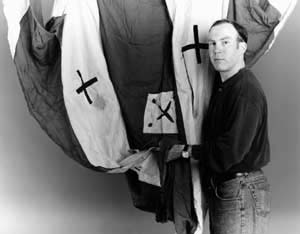 |
|
||
|
Vol. V No. 10 · 19 October 2001 |
|||
B.U. Bridge is published by the Boston University Office of University Relations.
Tribal flag gives rare glimpse of Afghan past
By Hope GreenS
We're hearing a lot lately about the fierce tribes of Afghanistan and
their legendary prowess at repelling foreign invaders. In light of current
events, it is intriguing to discover an artifact from one of these tribes
in the archives of Mugar Memorial Library.
|
|
|
| J. C. Johnson (COM'99), an archivist in BU's Department of Special Collections, with a banner that was carried by a 19th-century Afghan tribesman as he rode his horse into battle. Photo by Vernon Doucette | |
Stored away in the Department of Special Collections is a curious-looking
triangular banner, faded and a bit stained, with an assortment of symbols
appliqued onto alternating bands of red and white. Supporting documents
reveal that the artifact is a standard once carried into battle by a Waziri
tribesman near the border of Afghan-istan and what is now Pakistan in
the late 19th century.
The banner was donated to BU by British media magnate Cecil King (1901-1987),
who owned newspapers and television stations on three continents. According
to archivists, it originally belonged to King's father, Sir Lucas White
King, a professor of Arabic and Persian languages and a veteran of Great
Britain's Indian Civil Service.
Sir Lucas was a high-ranking commissioner in the service during a period
when England and Russia were vying for influence over central Asia. The
British Empire aimed to protect its most important colonial possession,
India, by controlling trade routes through Afghanistan.
Supporting documents for the banner reveal that Cecil King's father was
staying at a British encampment in the town of Wano, on what is now Pakistan's
northwestern frontier, in November 1894. His group was on a mission to
determine a border with Afghanistan. On November 3, a Waziri leader named
Powindah led a dawn raid against the encampment to avenge the imprisonment
of five of his men, whom the British had charged with murder.
The tribal offensive was not a success, although the British lost 44 men.
Among the 300 tribesmen killed were two horsemen whose bodies were found
not far from the camp. On the ground near them were two battle standards.
Sir Lucas writes that one of these had been carried by "a Talib of
Daur" and the other by "the notorious Abdal Rahman Khel raid-leader
Isaf," although supporting documents do not clarify which one he
kept as a souvenir.
Accompanying the banner in the King collection are several news clippings
on the battle at Wano. One newspaper featured a patriotic poem, which
concludes:
But while we give our troops their meed of praise for valour shown,
Let's not forget the men whose grit was equal to our own,
For never yet in border fight was charge more boldly made
Than that by those Waziris on the Wano First Brigade.
Cecil King donated several boxes of personal and ancestral documents to BU, including diaries of his experiences during World War II and his correspondence with politicians. The Department of Special Collections welcomes scholars wishing to review these and other archival materials; to schedule an appointment, call Sean Noel, assistant director of public services, at 353-3696.
![]()
19
October 2001
Boston University
Office of University Relations
